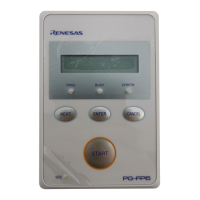PG-FP6 V1.06 8. Encryption Utility Program
R20UT4469EJ0800 Rev.8.00 Page 125 of 188
Oct.01.21
8.Encryption Utility Program
RPE.exe, which is bundled with this product, can be used to encrypt or decrypt program files.
Remark: RPE.exe is stored in the PackageFiles folder immediately below the folder where software for the
PG-FP6 has been installed.
8.1 Exit Code
When the operation was successful, exit code 0 is returned.
Otherwise, 1 is returned.
8.2 Command-line Syntax
The command-line syntax is as follows:
RPE <file> /password <password> [options...]
8.3 Start Options
The following lists start options for the PG-FP6.
Table 8.1 Start Options
Option Description
Specifies the file to be input (this specification is mandatory).
• The file can be specified as a relative path from the working directory.
• Files to be encrypted: Intel Hex, S-Record, HCUHEX, and RPI
• Files to be decrypted: RPE
password Specifies the password for use in encrypting or decrypting the file (this specification is
mandatory).
If the password includes symbols, enclose each in double-quotation marks (").
Decrypts an encrypted file (RPE).
If this option is not specified, the file is encrypted.
output Specifies the destination for output of a file.
If this option is not specified, the directory holding the input files is used.
• The file can be specified as a relative path from the working directory.
Prohibits overwriting of output files.
? Displays help information on the options.
Caution: Pathnames that include spaces must be enclosed in double-quotation marks (").
Remark: Enter a password made up of alphanumeric characters and symbols (up to 64 characters). The
usable symbols are as follows.
a-z, A-Z, 0-9, !, @, #, $, ^, &, *, (, ), _, -, +, =, [, ], {, }, ;, :, <, >, |, ., /, ?
Example:
> RPE "out.hex" /password "0123456789"
> RPE "out.hex" /password "0123456789" /output "out.rpe"
> RPE "out.rpe" /decrypt /password "0123456789" /output "D:\outputdir\"

